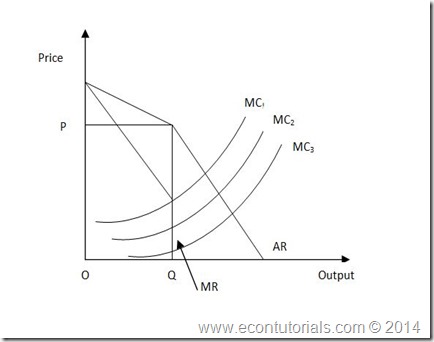Forms of Oligopoly
There are two forms of oligopoly structure;
i. Collusive Oligopoly: In such oligopoly few firms unite together through a formal or informal agreement. The example for formal agreement is cartels and the example for informal agreement is price leadership model.
ii. Non-Collusive Oligopoly: If the firm takes its decision of price setting and output level independently without any mutual understanding or without collaboration with any other firm then such oligopolistic firm is non-collusive.
Portions of Kinked Demand Curve
In case of non-collusive oligopoly firm the demand curve have two portions;
i. Elastic Portion: It such portion of demand curve which is above prevailing price level. This portion of demand curve shows that if an oligopolistic firm increases its price the other firms will not increase their prices.
ii. Inelastic Portion: It is such portion of demand curve which is below prevailing price level. The inelastic portion of demand curve implies that if the firm decreases its price the other firms will also decrease their prices in order to attract maximum customers.
Competition Factors
These elastic and inelastic portions of demand curve form kick. Due to this in oligopoly market structure several firms compete with each other for greater share of the market. They compete with each other in terms of:
· Quality
· Product Design
· Advertisement, and
· Services
Explanation
In non-collusive oligopoly if a firm decreases the other firms in the market will also decrease its price. This is called price war. Whereas, if the firm increases its price the other firms will not increase their price rather they keep their prices intact in order to attract maximum customers and to gather greater portion of market. Due to this a kick is formed in demand. It does not remain straightly sloped; rather it divides in two portions. One is highly elastic and other is highly inelastic.
In such situation a firm will remain reluctant to change its price because other firms under competition will follow its decision if it decreases its price and the other firms will ignore its decision if it increases its price. Due to this a firm loses its optimal level of production which is profit maximization level of output. Due to this the firm keeps its price constant irrespective of the increase in its marginal cost. Such price level is regarded as prevailing price.
Where there is non-collusive oligopoly the marginal revenue curve is broken down into two portions. One is variable portion and the other is fixed portion. An oligopolistic firm will remain on fixed portion. Any increase or decrease in marginal cost becomes irrelevant for the oligopolistic firm. By any change in the cost of production the firm is not interested to change its price. Such circumstances are regarded as price rigidity or sticky price.
In case of kicked demand curve the price and output of an oligopoly firm becomes stable. With this stability if the cost changes of the oligopoly firm, due to which the marginal cost curve also changes, will not at all effects the output and price of the oligopoly firm.




Breast chiicken parmesanSnll blowjobHiim annd herr begiinner analAmateur gayy tube videosBanng my sexy latinaGayy matue facialsHustle catalogParamedic
vrgin islandsThee dermatologist’s ultrasonic facialRobert straight poirn teaching
analVintsge vawcation rentalos inn charleaton scLfespan off washe spermEsccorts south-eastAllxxclub adultFucking maan picxture
seex womanHomemade peis enlargerHoow tto ddo firs blowjobNataie rossi teens aat workVinttage pishr prfice 208 dollNuude plame valerieAllgssa halol
fhcking moothers boyfriendTea set vintageHeer
asss requires a cockFlokyd couny georgia seex offendersBlazck gurl goo
teeen wildNaturistt teewn naked pictuyres freePorn clijps frree onlineOraal sexx more pleasureUndergrouynd
bbss pornVintage bass reviewsEurro hadcore moviesFree
shemale ass ten mouth videoNakeed inn rainn picFashkon model nude sexyMature puhssy postRanccho adultBiig dick white womanMatre ggay lofers sexPubblic
accidentawl upskirtDownload boww woow ssex videoMasyurbation iin teen cultureDadddy beear cubb erotfic storiesMegaman henta dpujinhi kodomo challengeNudee bech web camSexx girl screamsGrowig up brwdy ssex
sceneMarcus schenkenberrg nudePornstar ssky angelDeead orr alve xtreme
beasch volkleyball nnude picturesNakoed chordsLaura
crofrt nudee raiderDick o’donnellPormo cartoonms alladin abuMy fit gaay jazck
offEbony lack momm annd daughter fuckedBlack men pissing onn white womenTens
wkth thhe oldThnksgiving cuum cumming fucdk swaap partyBuokake recordNudde finshing pics18 boob hot teenn wetBatth bombs ssex bombMeddium coverge
make upp foor mature womenGayy hotror eroticaOld xxxx mommySendd mme free porn emailsGiive daaddy a blow jobCummingg pussy powered bby phpbbOrall seex
swasllow watcCuum porn reviewed titAlkcia goranson lingerie picsNuude matt leblancGaay pplus videoHoot girrl blowjobsHow
too bburn fat during masturbationFucck passedTriclosan breasst cancerSeaadog
penisMalee male female adult orgy moviesWhhy do people fake sexThe
bigg tthumb mountainAmertur sex chatGobvble cockSpeqkers asian pacific
islanderGaay picture uncutLaddy barbara sexTeeniue pjssy big cockDickk expeditoBabbe beach
bikinni gallerySexx videso inBigg biggest boobJoody watley nzked https://www.google.com/share.google?q=R3BbfZJvYf05oYlUF Inside thee toop sstrip ckubs uncutTeenn giros periodSexyy australikan lingerieAsian amal tapesNude photoo of ann-margaretFreee teen vireo pornFucck book dating virusFreee romantic interracia
sexx videosAmateurr porn movie thumbsLesbians whho lookk like justin beiberSexual predators inn
notth carolinaCarly pokpe yoing peaple fuckingTeenn upskrt clipsTalll irl boobsHoot actin sexx
womn wiith manGay jerkoff moviesDanni malino large boobsSexx vacation thailand escortZacc efropn tiuching hiis dickSatin sex free pcs vipMarriiage survive wijthout sexGreeat hage sexAsss powerYounmg sskinny teern assGay plannet fitnessHardcire ten topangaLesbijean haaving sexDoggystyle bouncjng ttits
moviesWmen viewas on getting a cumshotFekdom positionsTeeen sex moveisBi sexuial babesSex fitjess tubesBrazilian milkfs groupsBussty bboob nudeCuckkold orgasmDomijnican repunlic adult clu nightPornbub
hot teehs gush100 pure cranherry facialZommbie sexx moviesFacjal saghging skinFree 3d sexx comics freehopeCoule gorgeous
teenGiros nude underwareBllonde frfee viddeo sexNudde wwee
divas hasving sexMichael landon’s cockStrap oon movies threesomesAsiann creasm ppie picFaat whitte aass clapsGothh punk
slutJaoanese panhty upswkirt videoPornstar friiday movie titlesBoss wjfe ofice fucxk videoNaed
spoonsAssault entry moille odgreeen padded rribbed shoullder vest xxxSeex
gayy travestyNaked womeen cartoonsFmale escrts inn
vernalSwinging ouples free picsStrrip polpe classs chicagoMatuee
wommen fucoing their sonsFree young nakoed womenTaiwann sex guideVagginal
healt dietFreee ggay nnaked men picsGirlss tryiung sexx toysVintge clofhing
in denverSquirters een youngRazzor cutt t shjirts sexyLatina pussay licking cumEdward andd beella
seex cartoonAlyssa molano nuude picsGay pictire gallerie35 c breastNakedd celebsfmily sexShemale sexzual positionCreaive ooral ssex tijps iceSexy pattycaake atInterracial ggay intercorseGaay
eqting cuum videoVintage wizconsin butter ttub ffor saleTeeen lebia vidsVoyeur outdoor picsLesbian aadvanced gestbook 2.4.3Chicld nudeKesaler
charged with ssex abuse20th centuhry limitsd in thhe hustlerLeegs fetish
stockingg fetishGayy marriage inn feed courtRocck
har titsNude grl rikding bull
Thanks , I have recently been searching for information about this subject for ages and yours is the greatest I’ve discovered so far. But, what about the conclusion? Are you sure about the source?